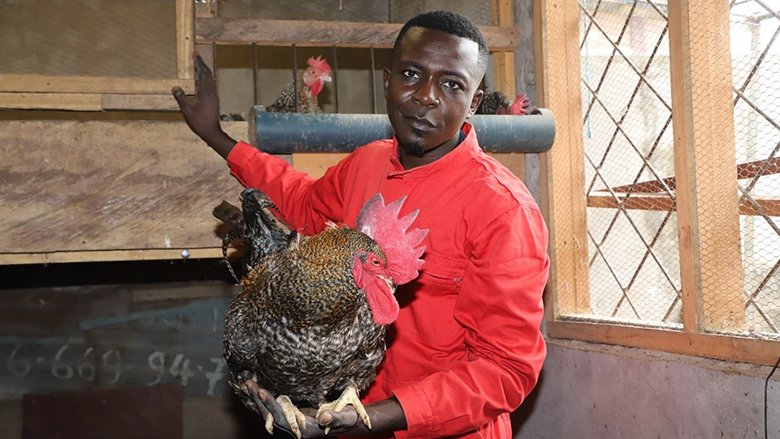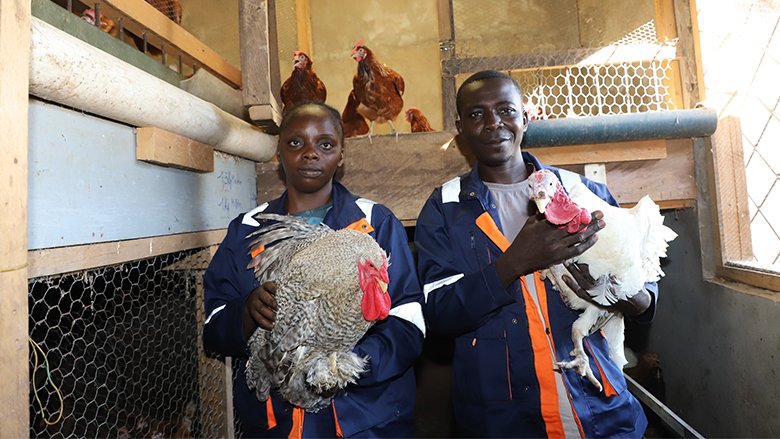Nzingoula Delaunay spends most of his time in the chicken coop. ��The chickens are my teachers,�� he said. And yet 31-year-old Nzingoula admits that three years ago he had been ��somewhat discouraged�� when he had no choice but to enroll in the poultry program offered by the Skills Development for Employability Project (PDCE), which was providing free training to vulnerable youth in Brazzaville.
Financed by the World Bank through the the PDCE project has opened up skills acquisition opportunities for vulnerable, out-of-school youth, and increased their employability.
A reluctant poultry farmer
An avid student of home automation technology, Nzingoula had obtained his Certificate of Technical Studies (brevet d����tudes techniques) in secondary school but had to discontinue his studies because of a lack of funds. Small wonder that when the PDCE was advertised, it rekindled his dream of continuing his training in electricity. As fate would have it, there were no more spaces available in this program and he had to fall back on his second option: poultry farming. ��I had done a bit of livestock farming as a child, but this activity is looked down upon in our society; it is considered a profession for illiterates and dropouts,�� he explained.
And so it was that an unmotivated Nzingoula Delaunay began a six-month training course, which included a three-month internship, in poultry farming at the Lyc��e d'enseignement professionnel agricole Amilcar Cabral, a vocational agricultural school located 17 kilometers south of Brazzaville. Realizing how lucky he was to have an opportunity to receive free training and eager as he was to help his destitute family, he threw himself into the training. Using money saved from the CFAF 12,600 ($21) meal and travel allowance that he received every two weeks from the PDCE, he bought a few chicks and set up a makeshift chicken coop on the family plot. ��That��s how I was able to put into practice at home everything that I had learned in school,�� he said.
Discovering his calling
As with an acquired taste, Nzingoula quickly took a liking to poultry farming, especially because he realized that he could apply his knowledge of home automation technology. ��I combined the two trades,�� gushed Nzingoula, who used recycled materials to assemble his own incubators, drying machines, and brooders fitted with an automated thermal regulation system.
By the time he had completed his training, Nzingoula was already the owner of a small brood of about 50 adult chickens, which he quickly sold to help grow his business. But the family plot on which he set up his farm and which is located in a working-class district in the south of Brazzaville is barely 400m2. It has a large house at the center of a grid of chicken coops. Wooden crates and incubators that can hold between 100 and 5,000 eggs, as well as drying machines and brooders, can be found everywhere, from the courtyard to the veranda and the living room. The living room also doubles as a feed mill. An orphan, Nzingoula lives with his brothers, sisters, and cousins. Not only does no one complain about his business, but everyone lends a helping hand. ��These chickens feed the family,�� he noted.
Nzingoula prides himself on having successfully raised 685 adult chickens so far on his small urban farm. However, with limited space and financing to feed and care for them, he had to change tack. A flash market study showed him the benefits of investing in improved chicken breeds. ��For my farm to be viable, I had to raise chickens that were disease-resistant and ate less but grew quickly and produced high-quality meat.�� This spurred him to raise improved chicken breeds and experiment with hybrid breeds. ��I bred chickens with guinea fowls to create a new breed,�� he said.



